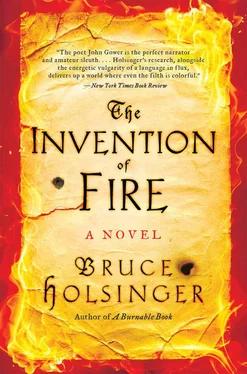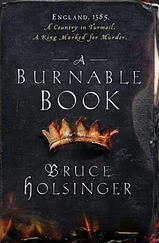Bruce Holsinger - The Invention of Fire
Здесь есть возможность читать онлайн «Bruce Holsinger - The Invention of Fire» — ознакомительный отрывок электронной книги совершенно бесплатно, а после прочтения отрывка купить полную версию. В некоторых случаях можно слушать аудио, скачать через торрент в формате fb2 и присутствует краткое содержание. Год выпуска: 2015, Издательство: HarperCollins, Жанр: Исторический детектив, на английском языке. Описание произведения, (предисловие) а так же отзывы посетителей доступны на портале библиотеки ЛибКат.
- Название:The Invention of Fire
- Автор:
- Издательство:HarperCollins
- Жанр:
- Год:2015
- ISBN:нет данных
- Рейтинг книги:3 / 5. Голосов: 1
-
Избранное:Добавить в избранное
- Отзывы:
-
Ваша оценка:
- 60
- 1
- 2
- 3
- 4
- 5
The Invention of Fire: краткое содержание, описание и аннотация
Предлагаем к чтению аннотацию, описание, краткое содержание или предисловие (зависит от того, что написал сам автор книги «The Invention of Fire»). Если вы не нашли необходимую информацию о книге — напишите в комментариях, мы постараемся отыскать её.
The Invention of Fire — читать онлайн ознакомительный отрывок
Ниже представлен текст книги, разбитый по страницам. Система сохранения места последней прочитанной страницы, позволяет с удобством читать онлайн бесплатно книгу «The Invention of Fire», без необходимости каждый раз заново искать на чём Вы остановились. Поставьте закладку, и сможете в любой момент перейти на страницу, на которой закончили чтение.
Интервал:
Закладка:
Chaucer liked to listen with his eyes closed, his forehead on a palm. At the close of the final couplet he turned and looked at me. “Quite a beautiful passage, John. The woe of witnessing is a powerful theme, one too often neglected in our versifying. Yet so many of our earthly crafts rely on witnesses and their testimony. Lawyers, chroniclers, clerks-”
“Justices of the peace.”
His lips formed a smile that quickly faded. He looked away. “There was a witness in the woods.”
“Oh?” I had known there was something Chaucer wanted to tell me about the massacre, though I hardly thought to hope for a firsthand account. We had spoken already about the attack at the city gate, my encounter with Rune, the crown’s discreet dealings with Snell, the pardon for Stephen Marsh, arranged through one of Chaucer’s old associates now in the office of the privy seal. Yet Chaucer, I could tell, had been keeping something back, waiting for the right moment. Now it had come.
“You met him, in fact,” he said.
I thought about our trying days in Kent, the hollow eyes of a gaunt country reeve. “Tom Dallid?”
“The very one.”
“Did Rune’s men ask him along? Order him?”
“No, nor did they discover his presence. After they emptied the gaol he started to feel wretched about it, said he knew it was a foul business. He followed the prisoners and soldiers at a distance, to the edge of the woods, then left his horse, went after them, and concealed himself near the clearing. He saw it all unfold.”
I remembered Dallid’s face, the impression of sullen fear the man had left. “Rune said it was a test, of both men and guns.”
“It was.”
“How did it work?” Rune died before he had a chance to tell me. Despite myself I felt a lingering curiosity about the details of the mass killing that had started all of this.
“A simple game,” Chaucer said. “Two men facing one another across the middle of the clearing, the distance between those two stumps we saw. They’re given instructions in how to load a handgonne, prop it on a stump, and fire. Then one is placed on the ground in front of each of the two men. Each prisoner is then ordered to load and fire at his opponent, and keep going until one of them dies.”
“And if they refuse?”
“They are shot by one of Rune’s archers-as indeed the first man was for refusing to play the game.”
At least one was killed with an arrow, that one there. Half the shaft’s still in his neck. Baker’s observation, in the St. Bart’s churchyard.
“All they had to hand was a pouch of powder, a pile of shot, a fire for the coals. Whoever triumphed in each round would remain in the game to meet the next man up. The last to survive would be granted his freedom.”
“Or hers.”
“Margery Peveril was to go last,” said Chaucer. “Robert Faulk was the man opposing her. He had just killed five of his fellow prisoners, one of them apparently his cousin. Shot them without a moment’s hesitation. Then it was his turn to face Peveril.”
I imagined myself in his situation. “He could not bring himself to kill a woman.”
“Not so,” said Chaucer, shaking his head. “He was immersed in the game, fully prepared to slaughter her along with everyone else he’d shot. But when he went to raise his gun to the stump he saw that she had him beat. She’d watched carefully, you see, and by the time her turn came she had practiced in her mind the quickest means of loading the weapon. Half of Snell’s men were jeering at him, the other half urging her to put the coal to the hole and kill Faulk. She raised the coal, and then-”
“She turned on them.”
“And shot Snell’s ablest archer in the face from ten feet. Across the clearing, Faulk did the same to the bowman guarding him. Even so it should have ended there, with Snell’s men drawing and making quick work of them. But Faulk is a renowned poacher. The sheriffs in Kent call him the quickest quiver in the shire. Once he had dispensed with the archer he snatched up the man’s bow, knelt by his corpse, and went for the others. He killed five of Snell’s men, fully half the company that had taken the prisoners out there, then escaped with the Peveril woman through the woods. At the tree line they took two horses and lamed the others with a hunting knife. Then they escaped.”
“Where did they go?”
“Northwards,” he said. “They joined a pilgrimage to Durham, traveled with them to the borders of the Palatinate.”
Cuthbert and his bones. “But they were coming from prison. How did they survive? Did they steal coin?”
“Peveril returned to the manor house after her escape, according to the loyal servants I questioned last week. Retrieved several large purses of coin she’d hidden away from her husband.”
“And where are they now?”
“Dead, I would guess. He was injured badly in a struggle at an inn near Derlinton, the sheriffs report. They escaped on horseback, in what direction isn’t known. I’ve had no news from the ports, which are carefully watched these days. As justice for Kent I would be one of the first to hear, but so far there has been only silence from the northern shires and the border. Her father’s family is Scottish, and I’ve wondered if she might have relations there.”
I considered it, though didn’t see how they could survive unmolested. “The marches are well guarded. A man and a woman, traveling alone?”
“Alone, yes, though they are clearly a resourceful pair.”
“Remarkable.” I thought of my elusive, resourceful son, who had endured much worse than a perilous border crossing. “Their tale should be romanced.”
“‘The Poacher and His Lady,’ perhaps?”
“These handgonnes certainly deserve their own verses, whatever their flaws.” I recalled Edmund Rune’s dark homage to the weapons in the Cheapside seld. My hands still felt the guns, still wanted them. The warm length of the barrel, the smooth joining of iron and wood, the dangerous thrill of the shot. I wondered that something so lethal could possess such allure to a bookish man like me.
“‘ As swift as pellet out of gun, when fire is in the powder run, ’” Chaucer rhymed, and I realized I had heard the lines before. One of his dream poems: a temple of glass, an eagle, a vision of the Milky Way. As always, Chaucer’s verse had got there first.
“They are devilish inventions, to be sure,” he went on in his dreamy voice. “And William Snell the very devil incarnate, slipping from the hands of Lady Justice despite what he’s done. This Stephen Marsh must be some new demon or demigod, but instead of carrying divine brands from Olympus, he sires up guns from the bowels of hell.”
We sat in silence as the brands in front of us crackled and hissed, our thoughts on the tools of war and crime, these instruments of violence running like dark currents through the long history of mankind. Abraham with his knife, King David with his sling and stone, Pontius Pilate with his cruelest cross, Arthur with his sword-and, now, William Snell with his guns, promising a future, by God’s grace, we would none of us live to see. We remained in the circle of warmth as the flames sank to coals, and the fire slowly died.
Chapter 51
Some miles north of the river Tweed, where the moors and fells of Northumberland begin their slow sweep up into the Scottish lowlands, there rises a range of mountains, broad and hulking mounds. Since our first maker pushed them up from the earth, the Cheviot Hills have filled the horizon with a somber dignity, strong sentinels against the northern sky, separated by gentle cols of heather and peat. Wyndy Gyle, Bloodybush Edge, Cairn Hill, the great mount of Cheviot itself: along these desolate and disputed hills wends a border separating two lands, two peoples, two kings. From south and north alike the area is under the watch and protection of the wardens of the East March, English and Scottish lords who expend the lives of their men in the preservation of ancient rights, timeless claims of clan and kin.
Читать дальшеИнтервал:
Закладка:
Похожие книги на «The Invention of Fire»
Представляем Вашему вниманию похожие книги на «The Invention of Fire» списком для выбора. Мы отобрали схожую по названию и смыслу литературу в надежде предоставить читателям больше вариантов отыскать новые, интересные, ещё непрочитанные произведения.
Обсуждение, отзывы о книге «The Invention of Fire» и просто собственные мнения читателей. Оставьте ваши комментарии, напишите, что Вы думаете о произведении, его смысле или главных героях. Укажите что конкретно понравилось, а что нет, и почему Вы так считаете.












